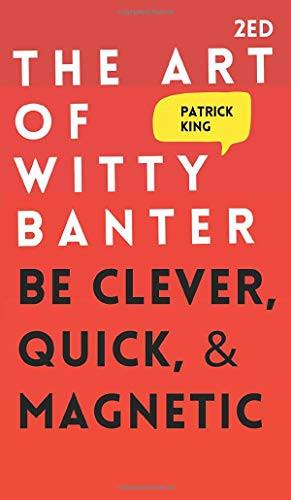Juliana 90's Key Ideas from The Art of Witty Banter
by Patrick King
Ideas, facts & insights covering these topics:
5 ideas
·5.08K reads
49
Explore the World's Best Ideas
Join today and uncover 100+ curated journeys from 50+ topics. Unlock access to our mobile app with extensive features.
Never Speak In Absolutes
When you avoid speaking in absolutes, you leave room for flexibility, openness, and the possibility of different perspectives.
- Avoid using words that imply certainty or absoluteness. Here are some words to be cautious: favorite, always, never, only, best, worst, absolutely, etc…
Instead of Absolute: "This is the best restaurant in town."
Avoid Absolute: "I really enjoy the food at this restaurant. It's one of my favorites in town."
Explanation: By expressing personal enjoyment rather than declaring it as the absolute best, you acknowledge that others may have different tastes and preferences
129
1.22K reads
Think Before You React
- Reactions are important, so say and do things for a reason.
- Pay attention to other people and ask yourself what emotion they want to evoke.
If you tend to react quickly or overreact, try the two-second rule. After someone finishes speaking, wait two seconds before responding. It shows that you're thinking about what they said before replying.
130
1.06K reads
Practice Free Association
Practicing free association is an excellent foundation for good conversation because conversation is about relating unrelated ideas, making connections, and going with the flow of topics.
Here's How to Practice:
Write 5 random words on a piece of paper. They can be anything—like a thing, action, memory, or feeling.
For example, if you write "napkin," quickly write down 3 things related to it. Then, take the last word you wrote and think of 3 things related to that word. Do this 3 times, then move on to the next set of words.
142
983 reads
Use Double Explanations
The layman’s explanations are the first step to a double explanation.
- Your goal is to give information in an interesting and unique way.
For example, when somebody asks, "What do you do?”
Your answer should be concise and engaging, like "I file paperwork for a living" or "I’m paid to argue with people," instead of a dull response like "I’m a lawyer."
You get people curious. You get them to open up about what you have to say.
The second step involves the expert explanation.
- Your goal is to draw their attention, opening up the conversation to deeper levels of engagement.
135
920 reads
More Effective Compliments
The first thing you need to focus on is what to compliment other people on.
- You have to choose things to praise others for that they genuinely care about.
Focus your compliments on two key areas: things people can control, like their clothing, style, hairstyle, and living space, and things they've made conscious choices about.
- It's important not to overdo it; too many compliments might come across as insincere or overwhelming.
When sincere, people feel comfortable and flattered, which encourages them to open up.
127
891 reads
IDEAS CURATED BY
CURATOR'S NOTE
In the first chapter of "The Art of Witty Banter: Be Clever, Quick, & Magnetic" by Patrick King, the focus is on establishing the groundwork for engaging in meaningful and enjoyable conversations. Here are the tricks and techniques you find in this chapter:
“
Discover Key Ideas from Books on Similar Topics
6 ideas
Life Skills
Nic Compton, Kim Davies, David Martin, Sara Rose
7 ideas
Unlimited Memory
Kevin Horsley
9 ideas
Conversational Intelligence
Judith E. Glaser
Read & Learn
20x Faster
without
deepstash
with
deepstash
with
deepstash
Personalized microlearning
—
100+ Learning Journeys
—
Access to 200,000+ ideas
—
Access to the mobile app
—
Unlimited idea saving
—
—
Unlimited history
—
—
Unlimited listening to ideas
—
—
Downloading & offline access
—
—
Supercharge your mind with one idea per day
Enter your email and spend 1 minute every day to learn something new.
I agree to receive email updates





